 Petzlover
Petzlover Chinese Crested Dog is originated from Mexico but Tenterfield Terrier is originated from Australia. Both Chinese Crested Dog and Tenterfield Terrier are having almost same height. Chinese Crested Dog may weigh 25 kg / 55 pounds lesser than Tenterfield Terrier. Both Chinese Crested Dog and Tenterfield Terrier has same life span. Both Chinese Crested Dog and Tenterfield Terrier has same litter size. Both Chinese Crested Dog and Tenterfield Terrier requires Low Maintenance.
Chinese Crested Dog is originated from Mexico but Tenterfield Terrier is originated from Australia. Both Chinese Crested Dog and Tenterfield Terrier are having almost same height. Chinese Crested Dog may weigh 25 kg / 55 pounds lesser than Tenterfield Terrier. Both Chinese Crested Dog and Tenterfield Terrier has same life span. Both Chinese Crested Dog and Tenterfield Terrier has same litter size. Both Chinese Crested Dog and Tenterfield Terrier requires Low Maintenance.
 The Chinese Crested Dog is believed to have its origins in Africa and there are many texts from the 19th Century that feature an Africa Hairless Terrier that resembles the Chinese Crested. However, the scientific and genetic evidence leads to an origin that is shared with the Mexican Hairless Dog. Any way you look at it the dog did not originate in China. The Chinese were very fond of this breed and used them on their ships to control the rat populations. This is probably how they got their name.
The Chinese Crested Dog is believed to have its origins in Africa and there are many texts from the 19th Century that feature an Africa Hairless Terrier that resembles the Chinese Crested. However, the scientific and genetic evidence leads to an origin that is shared with the Mexican Hairless Dog. Any way you look at it the dog did not originate in China. The Chinese were very fond of this breed and used them on their ships to control the rat populations. This is probably how they got their name.
There are two types of Chinese Crested Dogs – the well known Hairless, and the lesser known Powderpuff. The Hairless type is better known because they carry the dominant trait and the Powderpuff is recessive. However, this recessive gene is carried by every Chinese Crested Dog so the Powderpuff can show up in all litters even those of two Hairless Crested. Two Powderpuffs will not result in any Hairless in their litters as the Powderpuff does not have the gene for the Hairless.
The “Crest Haven” Kennel was opened by Debora Wood in the 1950’s to breed the Chines Crested Dog. At the same time Gypsy Rose Lee, of the famous burlesque shows, was also breeding Chinese Crested Dogs. The two lines of Crested bred by Americans came together following the death of Rose Lee. Every Chinese Crested that lives today can trace their heritage directly to these two breeding lines. In 1959, Debra Wood founded the American Hairless Dog Club which became a part of the American Chinese Crested Club or the ACCC in 1978. This organization then became the breed’s parent club after AKC (American Kennel Club) recognized the breed in 1991. Prior to this the Federation Cynologique Internationale, recognized the breed in 1987, the United Kingdom (UK)the Kennel Club recognized them in 1981 and the Australian National Kennel Council recognized the Crested in 1995.
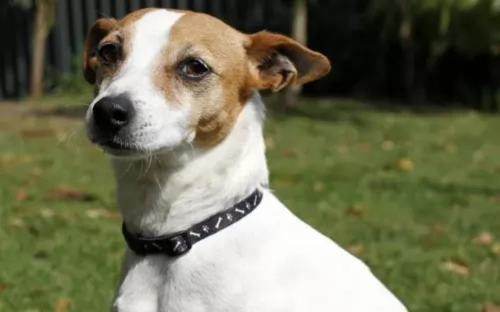 The ancestors of the Tenterfield Terrier came to Australia with the British and from them came this Australian breed. The English terriers were bred to be ratters on the ships to Australia. Today’s breed is a hardy, strong, athletic and agile dog. These first dogs were miniature Fox Terriers, bred for ratting. The miniature Fox Terrier was an established breed in the late 19th century in Australia with families and was know as a Mini Foxie. The breed became a steady presence in homes by the 1920’s.
The ancestors of the Tenterfield Terrier came to Australia with the British and from them came this Australian breed. The English terriers were bred to be ratters on the ships to Australia. Today’s breed is a hardy, strong, athletic and agile dog. These first dogs were miniature Fox Terriers, bred for ratting. The miniature Fox Terrier was an established breed in the late 19th century in Australia with families and was know as a Mini Foxie. The breed became a steady presence in homes by the 1920’s.
The breed might not have been named after the area of Tenterfield as many have guessed. Instead they may have been named after a breeder. The owner of the Tenterfield saddlery was called Tenterfield Saddler and he owned several of the breed. In 1990, Don Burke, a television personality suggested the breed be named the Tenterfield Terrier.
The Miniature Fox Terrier Club of South Australia. Now there were several clubs in Australia and a lot of disagreement about exactly what type of dog a miniature fox terrier was. Some did not think the name was legitimate, but they wanted recognition from the Australian National Kennel Club (ANKC). So, they became the Tenterfield Terrier Club of Australia in 1993. They were recognized by 2002.
Today the breed standard for the Tenterfield Terrier is different from the one for the Miniature Fox Terrier. They are now entirely separate breeds. In addition to the ANKC, the breed is recognized by the New Zealand Kennel Club but not by the AKC. It is also recognized by the American Pet Registry, Inc, the American Canine Registry and the Dog Registry of America, Inc.
 This is a toy breed and very small. The Hairless and the Powderpuff are two types of the same breed, although they do not look like it. The Hairless type can have fur anywhere on its body, but it will not have much. It will have hair on its paws, tail and head. The Powderpuff on the other hand will have a thick double coat. When discussing the color of the hairless, one is referring to the color of its skin. It can range from flesh to black.
This is a toy breed and very small. The Hairless and the Powderpuff are two types of the same breed, although they do not look like it. The Hairless type can have fur anywhere on its body, but it will not have much. It will have hair on its paws, tail and head. The Powderpuff on the other hand will have a thick double coat. When discussing the color of the hairless, one is referring to the color of its skin. It can range from flesh to black.
The Powderpuff has a soft, thick, straight double coat. It can have very long hair. The Hairless must have its skin taken care of and protected. Both types of Chines Crested are small in stature with well proportioned, athletic bodies.
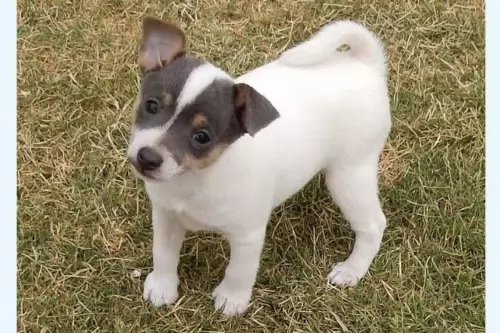 The Tenterfield Terrier is square and compact. He has a head shaped like a wedge and unusual in the terrier group. They have pricked ears and are predominantly white mixed with tan or black. They could also be tri-colored in black/tan and white or tan/liver and white. They have naturally occurring bob tails or docked tails. The nose is usually black unless the dog is liver colored, they have liver noses. The jaws are strong, and lips are tight with a strong neck.
The Tenterfield Terrier is square and compact. He has a head shaped like a wedge and unusual in the terrier group. They have pricked ears and are predominantly white mixed with tan or black. They could also be tri-colored in black/tan and white or tan/liver and white. They have naturally occurring bob tails or docked tails. The nose is usually black unless the dog is liver colored, they have liver noses. The jaws are strong, and lips are tight with a strong neck.
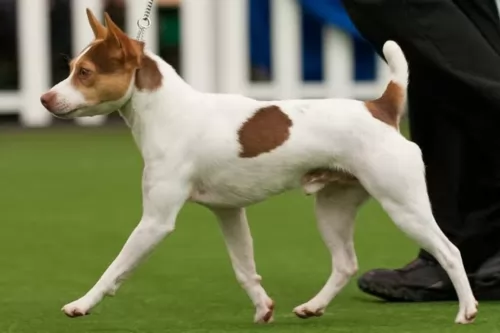 3.Adaptability – they need space even though they are small. They need a lot of exercise. They can adapt if they get another exercise. They can live in apartments and can play indoors as well as out.
3.Adaptability – they need space even though they are small. They need a lot of exercise. They can adapt if they get another exercise. They can live in apartments and can play indoors as well as out.
4.Learning ability – They are extremely intelligent, but they can be stubborn like all terriers.
 The Chinese Crested Hairless version must have its skin take care of much in the same way we take care of our own. It will burn if exposed to too much sun without protection. They can suffer from dry skin, acne, need moisturizing cremes. They get skin allergies as well and it is important to take care of the skin instead of the brushing you don’t have to do.
The Chinese Crested Hairless version must have its skin take care of much in the same way we take care of our own. It will burn if exposed to too much sun without protection. They can suffer from dry skin, acne, need moisturizing cremes. They get skin allergies as well and it is important to take care of the skin instead of the brushing you don’t have to do.
The Chinese Crested does not suffer from most of the diseases other toy breeds do. They can have ye issues. The Hairless have a “primitive mouth” . They have pointy teeth and poor dentition. This is not true of the Powderpuffs however. Their eye issues include:
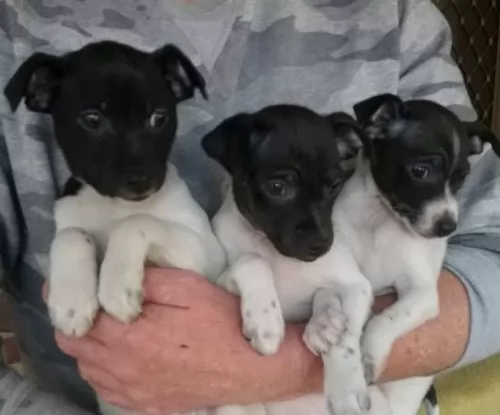 They are small in stature and because of their face they seem to have dental issues. The breed does not have a lot of health issues but deals with the same issues as many small terriers. Not all members of the breed are susceptible to these, but some are just like the Australian Terrier.
They are small in stature and because of their face they seem to have dental issues. The breed does not have a lot of health issues but deals with the same issues as many small terriers. Not all members of the breed are susceptible to these, but some are just like the Australian Terrier.
 Like several other toy breeds, it is easy to overfeed the Chinese Crested because it has such a small stature. Feed once or twice a day but never more than one fourth of a cup total for the day.
Like several other toy breeds, it is easy to overfeed the Chinese Crested because it has such a small stature. Feed once or twice a day but never more than one fourth of a cup total for the day.
Luxating Patellas – kneecaps move out of place and cause lameness and arthritis
Legg-Perthes Disease – a hip disorder where blood does not reach the head of the femur. The bone dies, and growth stops.
Canine Multiple System Degeneration (CMSD) – a progressive movement disorder can call falls
This Breed does not need an excessive amount of exercise, but they do enjoy running. They are competitive and athletic, so they can excel at flyball, lure coursing, agility and obedience. They are sensitive and trainable enough to become a therapy dog.
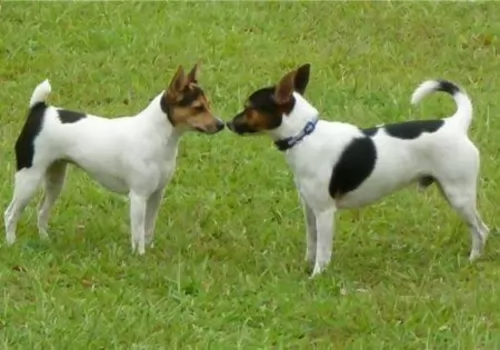 1.Feeding the puppy – Don’t overfeed but do feed high quality puppy food for small breeds and terriers.
1.Feeding the puppy – Don’t overfeed but do feed high quality puppy food for small breeds and terriers.
2.Feeding the adult – This is an active breed but don’t overfeed. Feed a high quality adult dog food for terriers or small breeds. Feed 2 times a day.
4. Games and Exercises – The breed has a high energy level and needs a lot of exercise. He is a terrier and loves to “go to ground”. Play activities that allow him to do that are best. He plays barn hunt, lure coursing and terrier specific competitions.